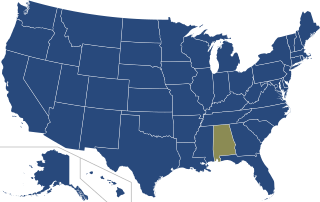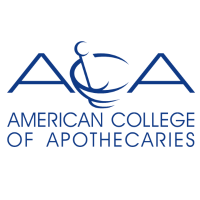The American Psychiatric Association (APA) is the main professional organization of psychiatrists and trainee psychiatrists in the United States, and the largest psychiatric organization in the world. It has more than 38,000 members who are involved in psychiatric practice, research, and academia representing a diverse population of patients in more than 100 countries. The association publishes various journals and pamphlets, as well as the Diagnostic and Statistical Manual of Mental Disorders (DSM). The DSM codifies psychiatric conditions and is used mostly in the United States as a guide for diagnosing mental disorders.

A pharmacist is a healthcare professional who specializes in the preparation, dispensing, and management of medications and who provides pharmaceutical advice and guidance. Pharmacists often serve as primary care providers in the community, and may offer other services such as health screenings and immunizations.

Pharmacy is the science and practice of discovering, producing, preparing, dispensing, reviewing and monitoring medications, aiming to ensure the safe, effective, and affordable use of medicines. It is a miscellaneous science as it links health sciences with pharmaceutical sciences and natural sciences. The professional practice is becoming more clinically oriented as most of the drugs are now manufactured by pharmaceutical industries. Based on the setting, pharmacy practice is either classified as community or institutional pharmacy. Providing direct patient care in the community of institutional pharmacies is considered clinical pharmacy.
Edwin Fuller Torrey, is an American psychiatrist and schizophrenia researcher. He is associate director of research at the Stanley Medical Research Institute (SMRI) and founder of the Treatment Advocacy Center (TAC), a nonprofit organization whose principal activity is promoting the passage and implementation of outpatient commitment laws and civil commitment laws and standards in individual states that allow people diagnosed with severe mental illness to be involuntarily hospitalized and treated throughout the United States.

The National Alliance on Mental Illness (NAMI) is a United States-based nonprofit organization originally founded as a grassroots group by family members of people diagnosed with mental illness. NAMI identifies its mission as "providing advocacy, education, support and public awareness so that all individuals and families affected by mental illness can build better lives" and its vision as "a world where all people affected by mental illness live healthy, fulfilling lives supported by a community that cares". NAMI offers classes and trainings for people living with mental illnesses, their families, community members, and professionals, including what is termed psychoeducation, or education about mental illness. NAMI holds regular events which combine fundraising for the organization and education, including Mental Illness Awareness Week and NAMIWalks.
The Royal Pharmaceutical Society is the body responsible for the leadership and support of the pharmacy profession (pharmacists) within England, Scotland, and Wales. It was created along with the General Pharmaceutical Council (GPhC) in September 2010 when the previous Royal Pharmaceutical Society of Great Britain was split so that representative and regulatory functions of the pharmacy profession could be separated. Membership in the society is not a prerequisite for engaging in practice as a pharmacist within the United Kingdom. Its predecessor the Pharmaceutical Society of Great Britain was founded on 15 April 1841.
The Treatment Advocacy Center (TAC) is a U.S. non-profit organization based in Arlington, Virginia, originally announced as the NAMI Treatment Action Centre in 1997. The TAC was subsequently directed by psychiatrist E. Fuller Torrey and identifies its mission as "dedicated to eliminating barriers to the timely and effective treatment of severe mental illness". The organization is most well-known for proposed laws, policies, and practices regarding legally compelled outpatient services or outpatient commitment for people diagnosed with mental illness. The organization identifies its other key issues as "anosognosia, consequences of non-treatment, criminalization of mental illness, psychiatric bed shortages, public service costs, violence and mental illness". Advocates for mental health have criticized TAC for endorsing coercion and forced treatment.
American Society of Health-System Pharmacists (ASHP) is a professional organization that represents pharmacists who serve as patient care providers in hospitals, health systems, ambulatory clinics, and other healthcare settings. The organization's nearly 60,000 members include pharmacists, student pharmacists, and pharmacy technicians. ASHP maintains a national database on U.S. drug shortages that is published on their website.
A mental health professional is a health care practitioner or social and human services provider who offers services for the purpose of improving an individual's mental health or to treat mental disorders. This broad category was developed as a name for community personnel who worked in the new community mental health agencies begun in the 1970s to assist individuals moving from state hospitals, to prevent admissions, and to provide support in homes, jobs, education, and community. These individuals were the forefront brigade to develop the community programs, which today may be referred to by names such as supported housing, psychiatric rehabilitation, supported or transitional employment, sheltered workshops, supported education, daily living skills, affirmative industries, dual diagnosis treatment, individual and family psychoeducation, adult day care, foster care, family services and mental health counseling.
Assertive community treatment (ACT) is an intensive and highly integrated approach for community mental health service delivery. ACT teams serve individuals who have been diagnosed with serious and persistent forms of mental illness, predominantly but not exclusively the schizophrenia spectrum disorders. ACT service recipients may also have diagnostic profiles that include features typically found in other DSM-5 categories. Many have histories of frequent psychiatric hospitalization, substance abuse, victimization and trauma, arrests and incarceration, homelessness, and additional significant challenges. The symptoms and complications of their mental illnesses have led to serious functioning difficulties in several areas of life, often including work, social relationships, residential independence, money management, and physical health and wellness. By the time they start receiving ACT services, they are likely to have experienced failure, discrimination, and stigmatization, and their hope for the future is likely to be quite low.

Clinical pharmacy is the branch of pharmacy in which clinical pharmacists provide direct patient care that optimizes the use of medication and promotes health, wellness, and disease prevention. Clinical pharmacists care for patients in all health care settings but the clinical pharmacy movement initially began inside hospitals and clinics. Clinical pharmacists often work in collaboration with physicians, physician assistants, nurse practitioners, and other healthcare professionals. Clinical pharmacists can enter into a formal collaborative practice agreement with another healthcare provider, generally one or more physicians, that allows pharmacists to prescribe medications and order laboratory tests.
Geriatric psychiatry, also known as geropsychiatry, psychogeriatrics or psychiatry of old age, is a branch of medicine and a subspecialty of psychiatry dealing with the study, prevention, and treatment of neurodegenerative, cognitive impairment, and mental disorders in people of old age. Geriatric psychiatry as a subspecialty has significant overlap with the specialties of geriatric medicine, behavioural neurology, neuropsychiatry, neurology, and general psychiatry. Geriatric psychiatry has become an official subspecialty of psychiatry with a defined curriculum of study and core competencies.
Psychiatric pharmacy, also known as mental health pharmacy, is the area of clinical pharmacy specializing in the treatment of people with psychiatric illnesses through the use of psychotropic medications. It is a branch of neuropsychiatric pharmacy, which includes neurologic pharmacy. Areas where psychiatric pharmacists are found most abundantly are in chemical dependency, developmental disabilities, long-term care facilities, adherence clinics, mental health clinics, and within the prison system. However, psychiatry and neurology are not the only areas where psychiatric pharmacists require comprehensive knowledge. They must also be proficient in clinical problem solving, interprofessionalism, and communication with understanding and empathy for the patient population they serve, as they are a sensitive group.
The following outline is provided as an overview of and topical guide to psychiatry:

Barry S. Fogel is an American neuropsychiatrist, behavioral neurologist, medical writer, medical educator and inventor. He is the senior author of a standard text in neuropsychiatry and medical psychiatry, and a founder of the American Neuropsychiatric Association and the International Neuropsychiatric Association.

A collaborative practice agreement (CPA) is a legal document in the United States that establishes a legal relationship between clinical pharmacists and collaborating physicians that allows for pharmacists to participate in collaborative drug therapy management (CDTM).

The American College of Apothecaries (ACA) is an international professional association in the field of independent community pharmacy practice. The organization offers continuing education (CE) credits for pharmacists in coordination with the Accreditation Council for Pharmacy Education. In 1977, the ACA helped establish the Joint Commission of Pharmacy Practitioners (JCPP) as a charter member. The ACA is affiliated with the American College of Veterinary Pharmacists (ACVP) and the ACA Research & Education Foundation. The current ACA Chairman is Thomas J. Hunt, RPh, FACA, FACVP, and the ACA President is Ryan Oftebro, PharmD, FACA, FACVP.

The Joint Commission of Pharmacy Practitioners (JCPP) is the largest professional delegation representing the interests of pharmacists within the United States. JCPP represents 13 professional associations in the field of pharmacy, developing consensus policy directives for the profession. It is well known for the 2014 development of "The Pharmacists’ Patient Care Process," which provides broad, consensus guidelines for how clinical pharmacists should practice.

The pharmacy management system, also known as the pharmacy information system, is a system that stores data and enables functionality that organizes and maintains the medication use process within pharmacies.









